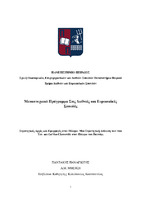Στρατηγικές αρχές και εφαρμογές στον πόλεμο : μια στρατηγική ανάλυση των Sun Tzu και Carl Von Clausewitz στον πόλεμο του Βιετνάμ

View/
Keywords
Στρατηγικές αρχές στον πόλεμο ; Sun Tzu ; Carl Von Clausewitz ; ΒιετνάμAbstract
This study examines the comparison of Sun Tzu and Clausewitz's strategies in the Vietnam War, focusing on the application of their strategies and their effectiveness under the specific conditions of war. Sun Tzu, with his emphasis on flexibility, asymmetry, and deception, provides strategies that favor guerrilla warfare and the exploitation of the opponent's weaknesses (Sun Tzu, 2013:24,50,54). In contrast, Clausewitz, with his concepts of "center of gravity" and "friction," focuses on destroying the enemy's strategic core through conventional strategies and concentration of forces (Clausewitz, 1999: 351-352⸱109).
The analysis highlights the difference in the application of their strategies during the Vietnam War, with Sun Tzu proving more effective due to the nature of the war, which was asymmetrical and required adaptability and guerrilla tactics. In contrast, Clausewitz's strategy, which focuses on the complete destruction of the enemy, was less effective due to the difficulties faced by the US in that particular war, but mainly due to a miscalculation of the enemy's "center of gravity." (Heilbrunn, 1967:257-260). The study provides important lessons for understanding strategy in modern warfare and highlights the value of asymmetric strategies, always in combination with conventional military forces in wars such as the Vietnam War.


